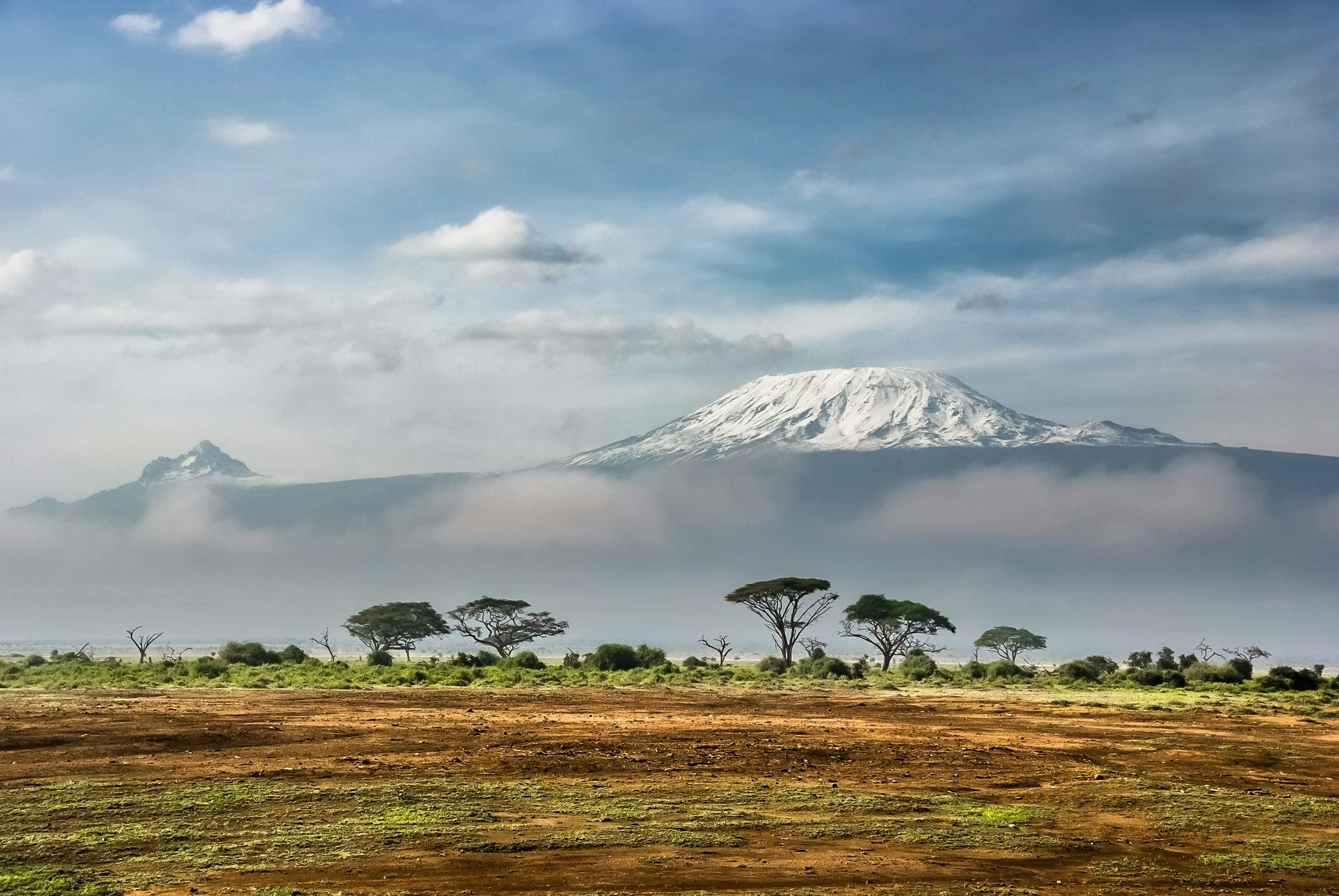Kenya
View of Mount Kilimanjaro
My father Pravin Chandra Rawal was born in Nairobi Kenya on 6 June 1930, the second son of Premshankar and Shantagauri Raval. The children were Narendra; Pravin; Gunvant; Harish; Shashi; Vinod and Renuka. Their parents had moved to Nairobi from Gujarat in the 1920’s where Premshankar took a job as an accountant in the railway department.
From the 1880’s onwards the british had recruited Indians to staff the development and expansion of the railways as the engine of colonisation of East Africa. The city of Nairobi existed as a mere depot in 1897 but within two decades had become a centre of british colonial power. The Rawal family enjoyed free travel on the railways as well as spare time and Pravin recalled cycling with his friend Shantu to an extinct volcano in the rift valley, as well as long train journeys to Kampala, Eldoret, Tabora, Dar-es-Salaam and Zanzibar.
The children attended the Nairobi Indian High school, where Pravin excelled in painting and writing. He developed a confident, flowing style of handwriting. Aged only 14 he was befriended by members of the Nairobi chapter of the Gujarati Literary Society, whose members included poets, writers and painters. The inter-war years were a golden age for modern Gujarati literature and the poems of Tagore; novels, short stories, plays, essays, criticisms and travel books would have been discussed.
“There was also a railway library where dad used to take us. In this library for the first time I read african stories. Some of the different tribes of africans were Kikuyu, Jaluo, Walkamba and Masai”
After leaving school until the age of 23 Pravin worked on the Nairobi Daily Chronicle as a learner journalist, then on the Colonial Times as a features editor. Given their somewhat generic titles it is interesting to note that both newspapers were Indian-owned, socialist and anti-colonial. In later life Pravin would often refer to editor Haroon Ahmed as a great mentor.
Much later in life Pravin was to return to his early literary interests, speaking of his love for the poetry of Tagore; studying and teaching Sanskrit, Gujarati itself being derived from that ancient language.
During his youth Pravin developed a critical attitude to aspects of Brahmin culture and the traditional caste system with its attendant social divisions. Janoi (Upanayana) was a ceremony that included rituals involving family, child and teacher. Young boys received during this ceremony a sacred thread called Yajñopaveetam which they would wear as a symbol of their initiation into formal education. Like other 8 year old boys he received his sacred thread, but later returned it as an act of rebellion. Quite what his parents thought about this gesture of defiance isn’t recorded, but and it is hard to miss the likely influence the social equality ideas of Mahatma Gandhi would have had on Pravin as an idealistic teenager.
Gandhi
Born and raised in a Hindu merchant caste family in coastal Gujarat, and trained in law in London, Mohandas Gandhi (1869-1948) first employed nonviolent civil disobedience in South Africa, in the resident Indian community's struggle for civil rights. After his return to India in 1915, he set about organising peasants to protest against excessive tax and discrimination. His activism was threatening to governments in both South Africa and India and he was imprisoned many times in both countries. He lived modestly in a self-sufficient residential community; ate simple vegetarian food, and undertook long fasts as a means of both self-purification and political protest. His abundant writings on these activities were were translated from Gujarati and published around the world. All this would have been of great interest to indians in Nairobi, but then came the traumatic events of partition. Later still a radio announcement from India on 30 January 1948 was to stand out in Pravin’s memory:
“All India Radio is in Ahmedabad and we used to listen to news, dramas and music. When Mahatma Gandhi was assassinated Prime Minister Nehru made a speech from Delhi in which he quoted an english poem: ‘Captains and Kings of my generation are passing away and I feel desolate in my heart and willowed in spirit’”

